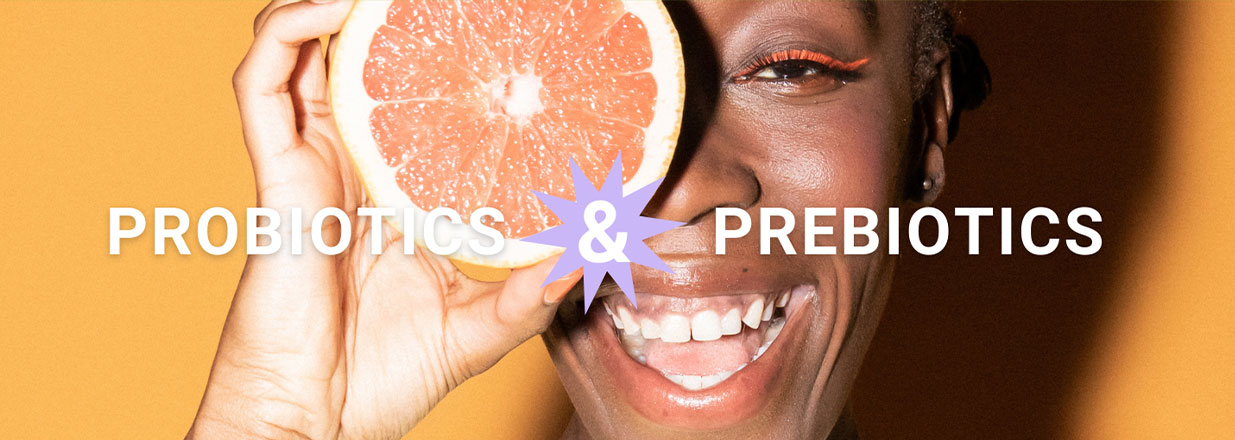Probiotics and prebiotics have become a new trend in health and wellness, especially in maintaining a healthy gut. But before you click add to cart, you might want to ask these questions to see which products are suitable for your gut health needs:
How do prebiotics work?
Prebiotics are any substance used by microorganisms inside the body that confers health benefits. Translation: prebiotics are what feed your beneficial microbes.
Most prebiotics are types of dietary fiber, which is a kind of carbohydrate that human enzymes can’t digest. However, not every fiber is a prebiotic because there are two categories of dietary fiber: soluble fiber, which is fermented by gut bacteria, and insoluble fiber, which is not fermented. The soluble fibers that are metabolized by beneficial gut microbes are considered prebiotics. Inside your gut, prebiotics stimulate the beneficial gut microbes to grow, improving gut health and other health areas.
Some prebiotics derive from sources besides food and impact parts of the body beyond the gastrointestinal tract, but most of the ones we know about are found in food.
Which foods contain prebiotics?
Plants like:
-
Jerusalem artichokes
-
chicory root
-
apples
-
bananas
-
asparagus
-
onions,
-
leeks,
-
and garlic contain small amounts of prebiotics.
In addition, some yogurts, cereals, and breads contain prebiotic additives, like galacto-oligosaccharides (GOS), fructo-oligosaccharides (FOS), and inulin.
While it’s no longer on the menu for adults, breast milk contains oligosaccharides, a prebiotic that increases the population of healthy Bifidobacteria and discourages the growth of bad bacteria in babies’ guts. In fact, several types of infant formula are now supplemented with oligosaccharide prebiotics.
What are the major health benefits of prebiotics?
Some health benefits of having prebiotics in your diet include; improved gastrointestinal health (inhibition of pathogens and immune system stimulation), reduced blood lipid levels, and improved brain function.
Recent research has found that prebiotics may help prevent and treat Type 2 diabetes and cardiovascular disease, lower cholesterol, and positively impact metabolism. Researchers have also found that a healthy gut microbiome fed by prebiotics positively affects bone density and strength.
A 2017 study published in the American Journal of Clinical Nutrition found that children who tried prebiotics felt more satisfied after a meal, which could help children with obesity regulate their appetites. In addition, a 2017 study at the University of Colorado published in Frontiers in Behavioral Neuroscience was the first research to demonstrate that a prebiotic diet provides protection from stress and positively impacts sleep.
Prebiotics represent an exciting new area of scientific research. Many organizations are funding projects to study how they work, what they can do, and how they might be used to prevent or treat disease.
How can I use prebiotics to improve my health?
Fruits, vegetables, and whole grains contain prebiotics, so your healthcare provider’s usual advice about including various fruits, veggies, and grains in your diet is undoubtedly sound. Eating plenty of fiber-rich foods will also help you absorb prebiotics, vitamins, and minerals.
If you’re following the dietary guidelines for fiber intake, you’d want to eat 25 grams of fiber for every 2,000 calories you consume each day. The bonus is that by eating healthy, plant-based, fiber-rich foods, you’ll gain other health benefits, too.
There are prebiotic supplements on the market, but because there are different types of prebiotics that work in different ways, it’s hard to know whether a prebiotic supplement will accomplish specific health goals. It’s easier and less expensive – not to mention tastier – to get your prebiotics from food.
- How do probiotics work?
Probiotics are live and active cultures of bacteria that support a healthy digestive tract. Eating them, or having them inside your gut, can help your digestive system function more efficiently and may contribute to a more beneficial immune system, among other health benefits.
Probiotics exert their action through different mechanisms in your body, modifying gut microbiome activities, inhibiting harmful bacteria growth, or improving your intestinal transit.
The presence of probiotics within your gut is dependent on several factors. For example, a person would respond differently to probiotics based on their personal microbiome, the probiotic bacteria they have consumed, the dosage of probiotic bacteria, and the duration of time that individual took the probiotic.
Which foods contain probiotics?
You can obtain probiotics mainly from two primary sources; certain probiotics foods and dietary supplements.
Fermented foods are a great source of probiotics. Foods like:
- Yogurt
- Kefir
- Sauerkraut
- Tempeh
- Kimchi
- Miso
- Kombucha
- Pickles
- Buttermilk
- Natto (fermented soybeans)
- Some cheeses
Dietary supplements are proven to be a good source of probiotics as well. They can be consumed in different formats such as capsules, powders, drinks, and in mixtures of varying doses. Dosage is often expressed on colony-forming units (CFU), a number that represents the number of viable cells in that product. However, keep in mind that a higher CFU does not necessarily mean you will receive healthier benefits.
What are the major health benefits of probiotics?
The two key probiotics hard at work to keep your gut healthy are Lactobacillus and Bfidobacterium.
Lactobacillus is the beneficial bacteria that play a role in helping you digest your food, reduce the amount of disease-causing cells in your body, and feed the microbes that help vitamin and mineral production in your gut.
Bfidobacterium bacteria reside in our stomach and intestines and provide health benefits similar to Lactobacillus. This type of bacteria helps with breaking down food, helps us absorb nutrients, and provides immunity to help fight off bad bacteria.
These good bacteria have been proven to help our body with skin irritants, digestive issues, and prevent symptoms related to diarrhea or irritable bowel syndrome (IBS).
Are there health risks in using probiotics?
In the U.S., probiotics are most commonly sold as a dietary supplement and do not require approval from the drug administration or FDA. More recently, probiotics can be found in foods, drinks, and even skincare products with promising benefits to improve the health of your gut or skin. However, it is up to the manufacturers to ensure that probiotics are safe to use before being put on the consumer market.
In addition, in recent studies conducted by disease specialists, clinicians are beginning to recommend probiotic supplements for probiotic therapies. For example, it has been tested and proven that certain probiotics may help treat gut dysbiosis in those who suffer from COVID-19. Probiotic therapy has also shown benefits to those struggling with Crohn’s disease and other digestive conditions. Several small studies have outcomes suggesting that certain probiotics may assist in maintaining remission of ulcerative colitis and used as preventative measures in relapse of Crohn’s disease.
However, because few treatments are available for these diseases, many people have resorted to probiotics before clinicians and researchers have provided a verdict on their specific strains. Therefore, more research is needed when considering probiotics as treatment options for digestive diseases.
How can I use probiotics to improve my health?
A good start to introducing probiotics into your diet is incorporating probiotic-rich foods into your diet like those listed above.
In addition, accessibility to probiotic supplements is quite easy. You can find them in any local grocery or drug store near you. However, if you are interested in including probiotic supplements in your diet, it is recommended that you seek advice from your doctor or health care professional.
Each probiotic has their own benefit given the diversity of the strains available for consumption and it is important to begin a conversation with your health care provider to pinpoint what symptoms you would like to address by taking probiotics.
How do you shop for Prebiotics and Probiotics?
With scientific innovation and the growing popularity of at-home care, probiotics, and gut health in self-care wellness. However, it’s still important to do your research into what specific probiotics and dietary supplements can help you improve your health.
Not all probiotics or prebiotics are the same. Different strains of bacteria have different effects. For example, you may want to begin taking probiotics to reduce inflammation, but what specific probiotic strains can target that issue? Here are some tips to pinpoint what you are looking for:
- Read the ingredient labels. It’s easy to pick up any probiotic or prebiotic supplement at your local store. But it’s important to know what the ingredients are. In addition, you need to know the correct dosage that is right for you.
- Talk to your doctor or a health professional. Before incorporating probiotics into your diet, the critical question to ask yourself is “why?”. Addressing the symptoms you want to relieve with probiotics should be discussed with a licensed health care professional.
- Take a gut microbiome test. A gut microbiome test can tell you the current status of your gut and identify which bacteria are promoting or hurting your health. With Gut+, you can get insight into the probiotics that reside in your belly with a personalized probiotic profile to determine which probiotics are right for you!
Be the first to hear about all things Kean Health,
get exclusive access, and get 35% off your first order!




